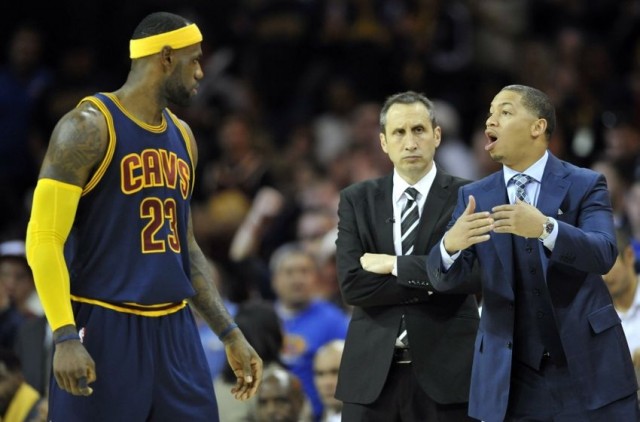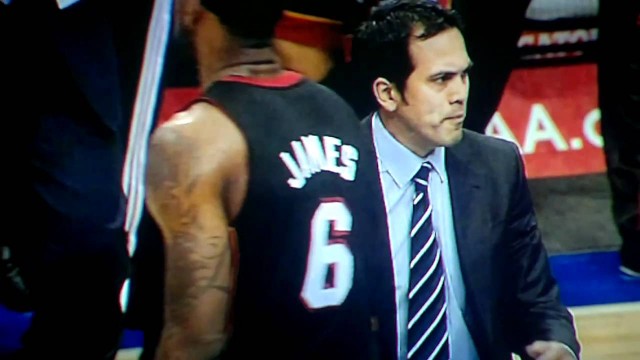Certain teams, at certain times in their history or evolution (or both), are expected to win world championships and nothing less.
Viewed from this vantage point and phrased in this manner, it’s understandable to see why the Cleveland Cavaliers fired head coach David Blatt on Friday afternoon, despite a 30-11 record and a first-place standing in the Eastern Conference at the midpoint of the season.
The idea and intent behind this move are easy to see. There is a feeling — moreover, not even an inaccurate one — that the Cavs, as presently constructed, are not in an ideal position to win the NBA title, the first in franchise history. The Golden State Warriors’ 34-point win last Monday in Cleveland affirmed that notion. A loss to the San Antonio Spurs a few days earlier didn’t exactly help.
In cutting to the chase — really, one doesn’t have to mince words here or dance around certain realities — it’s not as though the Cavs didn’t have to make adjustments of some sort. The question always was, “What kinds of adjustments did the organization need to make?”
Firing the head coach, eh?
Well, now…
One is brought in touch with a few particularly memorable coach firings in NBA history as a result of this bombshell, delivered on a Friday afternoon.
First, Magic Johnson ushered Paul Westhead out of power as the head coach of the Los Angeles Lakers in November of 1981. The Lakers were one year removed from their 1980 world championship, won by Westhead as the interim-turned-permanent head coach after previous coach Jack McKinney suffered a serious injury while riding a bike in November of 1979. That accident occurred just days into McKinney’s first (and as it would turn out, only and truncated) season as the boss of the Lake Show.
When Westhead took the permanent job with the Lakers (McKinney’s recovery was slow, precipitating the organization’s decision to make Westhead the permanent coach), he brought along an assistant from the Lakers’ broadcast booth.
The man’s name was Pat Riley.
When Magic pushed Westhead out in 1981, with the Lakers swimming in turmoil, Riley became the new head coach. Assistant general manager Jerry West got out of the way, and general manager Bill Sharman — coach of the 1972 world champions in L.A., with West on the floor — also allowed Riley to run what would become Showtime.
The rest, as they say, is history… and Riley made more of it in another particularly memorable coaching move.
*
In the 2005 Eastern Conference Finals, Larry Brown outcoached Stan Van Gundy and led the Detroit Pistons past the Miami Heat. The Pistons notched a second consecutive NBA Finals appearance, while the Heat — in a win-now mode and denied their first trip to the Finals — grew restless.
More precisely, the man running the Heat grew restless. Riley occupied that seat of power.
Riley sacked “Stan Van” early in the 2005-2006 season. His chosen replacement? Himself. It was a brutal move, a cold move, an unfair move.
The Heat had to make the NBA Finals — at the very least — in order to justify the move. Winning a title became the only way the move would be unquestioned in the larger run of NBA history.
Riley — cutthroat and unfair though he was — backed up his move and his own coaching acumen by winning the Heat’s first title. Riley won that title with old and expensive veteran players, however, so the Heat had to let most of those pieces go in 2007. Riley endured a season as a bottom feeder and then stepped away from the bench for good. He hired Erik Spoelstra to coach the Heat.
Three years later, Riley — as an executive — brought LeBron James to Miami… away from Cleveland.
This is where the Cavs’ firing of David Blatt really comes into focus.
*
Do not doubt for a second that — whether formally “consulted” or not — LeBron James essentially fired David Blatt on Friday. The particular words you hear, or the specific machinations of the process, might say that LeBron didn’t “know about” or “participate in” this decision. Those words and machinations — as reported by various sources throughout the NBA — mean nothing in any meaningful or larger sense.
No NBA organization fires a coach under these circumstances… not until now:
David Blatt: 1st head coach to be fired when his team has best record in its conference since conferences began (1970-71)
via @EliasSports
— ESPN Stats & Info (@ESPNStatsInfo) January 22, 2016
Gee, what unique power dynamic possibly could have allowed that to happen?
Cavs owner Dan Gilbert didn’t pull the trigger here. General manager David Griffin didn’t orchestrate this move with LeBron in the shadows.
Let’s not pretend to be ignorant of what’s going on. You have to go back to Miami and Riley to appreciate this.
As long as Riley was around in Miami, lending support to Spoelstra, LeBron did not enjoy unlimited, unchecked power. Dwyane Wade was the on-court franchise icon, Riley the unquestioned leader of the larger operation. LeBron had to work within those constraints, even with his political and economic clout. LeBron became a great recruiter for the Heat, wooing complementary players to the organization to keep the machine running smoothly, but Riley was the ultimate architect and engineer, the man who held everything in place.
Why — we all wondered — would LeBron leave Miami for Cleveland? There certainly was a romantic dimension to the decision (the one after “The Decision” to go to South Beach in 2010). LeBron returned home, to his roots, to give Cleveland a championship, to pay back fans after leaving them a few years ago. Yes, that was part of it.
The other part was the more hardened and calculating side of James in evidence:
“If I get to return home and instantly make this franchise relevant again (it had ceased to be in LeBron’s absence), I get to call the shots. Not you, Dan. Not you, David. I do. You guys make things happen because I am coming back to save the organization. Without me, you wouldn’t be in position to do anything, and David Blatt would be coaching some scrubs.”
This was not really in dispute last season, was it? LeBron had, in effect, become the man in charge of the Cavs.
Griffin did a superb job executing the deals which transformed the team in the middle of the season and enabled Cleveland to reach the Finals for the second time in franchise history. Gilbert opened up his pockets to win now. Blatt — who was hired before LeBron came aboard — adjusted to the situation as best he could. Through it all, though, LeBron was the prime mover.

SAN ANTONIO, TX JUNE 6: Miami Heat owner Micky Arison, President Pat Riley and LeBron James speak during practice as part of the 2014 NBA Finals on June 6, 2014 at the Spurs Practice Facility in San Antonio, Texas. NOTE TO USER: User expressly acknowledges and agrees that, by downloading and or using this photograph, User is consenting to the terms and conditions of the Getty Images License Agreement. Mandatory Copyright Notice: Copyright 2014 NBAE (Photo by Garrett Ellwood/NBAE via Getty Images)
There was no Pat Riley, and just in case the on-court chemistry of the Cavs was an issue, there was no Dwyane Wade to view as a mentor or counselor of equal standing.
This was as genuine a player-coach situation in the league (without the formal titles) since Bill Russell player-coached the Boston Celtics to the 1969 NBA title. Of course this was LeBron’s team.
It was — and is — therefore entirely LeBron’s responsibility to bring the Cavs and the city of Cleveland a championship… and not an Eastern Conference championship. He saw Blatt as the piece which had to go (first). Maybe he’s not done, but Blatt was his starting point.
Structurally and procedurally, the move is not hard to understand.
What’s hard to understand is why the Cavs — errrr, LeBron — would view Blatt as the main problem when, as colleague Joe Manganiello so ably said on Tuesday after “Warriors 132, Cavs 98,” the flaws of Kevin Love were so thoroughly exposed.
Does LeBron really think that a coaching change will bring about enough of a transformation to beat the Warriors or the Spurs in the Finals? Does he think it’s just about moving chess pieces differently, and that the Cavs’ pieces aren’t inadequate in the face of two remarkably great teams from Oakland and San Antonio?
It’s not that the Cavs or even LeBron himself have failed. Who could have expected that two other teams would produce remarkable first halves to this NBA season, both on pace to hit or exceed 70 wins, something only one team has ever done before? Cleveland is still the overwhelming favorite to make the Finals. Losing to the Dubs or Spurs would have brought no shame to LeBron, Blatt, or anyone in the Cavs organization — not this season.
Now that LeBron has fired Blatt, however, anything less than a title — a victory over Golden State or San Antonio — will be seen more as a failure than it ever should have been. When you go cutthroat the way Magic Johnson did in late 1981 or as Pat Riley did in December of 2005, you need to win it all if you’ve won it all before, or you need to at least reach a level you haven’t reached before (the Heat making the Finals after failing to do so at any prior point in their history).
Magic in 1981-1982, and Riley in 2005-2006, both made good on their power plays. They turned them into Larry O’Brien Trophy photo-ops.
It’s now up to LeBron, more than before — more than it ever needed to be — to win it all this June.
Anything less will be seen as failure. It didn’t have to be this way… but Friday’s dismissal of David Blatt allows for no other interpretation.



